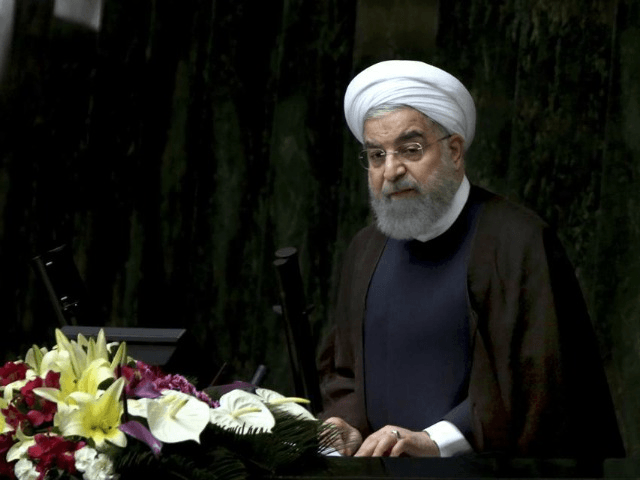Iran’s “moderate” President Hassan Rouhani declared on Tuesday that his country could pull out of Barack Obama’s nuclear deal and restart its weapons program in a matter of hours if the United States imposes any further sanctions.
“Those who try to return to the language of threats and sanctions are prisoners of their past delusions. If they want to go back to that experience, definitely in a short time—not weeks or months, but in the scale of hours and days—we will return to our previous situation very much stronger,” Rouhani told his parliament, as transcribed by the UK Guardian.
Rouhani called the nuclear deal a “model of victory for peace and diplomacy over war and unilateralism,” but accused the United States of failing to meet its commitments.
“In recent months, the world has witnessed that the US, in addition to its constant and repetitive breaking of its promises in the JCPOA, has ignored several other global agreements and shown its allies that the US is neither a good partner nor a reliable negotiating party,” he said.
America’s ambassador to the United Nations, Nikki Haley, insisted that the new sanctions voted into place by Congress and signed by President Trump pertain to “missile launches, support for terrorism, disregard for human rights, and violations of U.N. Security Council resolutions,” which are all beyond the purview of the Joint Comprehensive Plan of Action (JCPOA).
Iran, however, views the nuclear deal as a one-way agreement that permanently blocks all future sanctions from Western nations. Haley insisted Iran “cannot be allowed to use the nuclear deal to hold the world hostage,” but that is exactly what Iran is using it for.
Iran thinks Obama’s deal even bars American criticism of Iran’s human rights abuses and support for terrorism. Iranian Foreign Ministry spokesman Bahram Qassemi ripped his counterpart at the U.S. State Department, spokeswoman Heather Nauert, on Wednesday for her “repetitive and unrealistic remarks” about Iranian violations of the JCPOA.
“The one who has made these remarks does not seem to be much interested in establishment of peace, stability, and security in the Middle East and the world, and not satisfied with the declining trend of terrorism in Iraq and Syria,” Qassemi said.
Nauert said on Tuesday that the United States believes Iran is engaged in “destabilizing activities” which are not directly addressed by the nuclear deal, mentioning the harassment of U.S. Navy ships as one example.
Another Iranian tendency is to claim that America is violating the nuclear deal by not doing enough to encourage U.S. and European countries to do business with Iran. Qassemi struck that note in his remarks, accusing the U.S. of “unconstructive and provocative acts” which soured global opinion against Tehran and “stopped Iran from reaping the full benefits of the JCPOA.”
U.N. Secretary-General Antonio Guterres urged all parties to “do whatever we can to preserve” the nuclear deal, which he hailed as “one of the utmost diplomatic achievements in our collective search for peace and security,” even though the Iranians just announced they could be back on track for nuclear weapons in a matter of hours.
Russian Foreign Minister Sergei Lavrov also encouraged Iran to stick with the deal after Rouhani issued his threats. However, Lavrov also implied the new U.S. sanctions would violate the deal, denouncing them as “irresponsible actions that can hurt and undermine the balance achieved.”

COMMENTS
Please let us know if you're having issues with commenting.